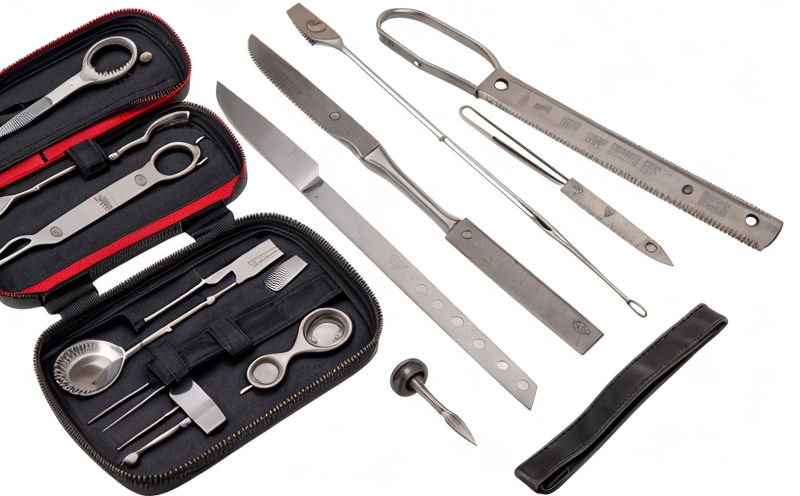Wear Resistance Testing of Reusable Surgical Instruments
The wear resistance testing of reusable surgical instruments is a critical aspect of ensuring their longevity and effectiveness in medical procedures. Surgical instruments, being subjected to continuous use, must withstand rigorous conditions without compromising patient safety or operational efficiency.
In this context, wear resistance refers to the instrument's ability to resist mechanical abrasion, friction, and other forms of wear that occur during repeated sterilization processes and surgical usage. The testing process involves subjecting these instruments to controlled environments that mimic real-world use and cleaning conditions, thereby evaluating their durability under specified stress levels.
Reusable surgical instruments are primarily made from materials such as stainless steel, titanium alloys, or cobalt-chromium-molybdenum (CoCrMo). Each material has its unique properties influencing wear resistance. For instance, stainless steel is highly resistant to corrosion but may not be the most wear-resistant due to its surface hardness. On the other hand, titanium and CoCrMo offer exceptional strength and biocompatibility while providing superior wear resistance.
Testing methodologies typically involve abrasive testing machines or pin-on-disk testers where the instrument's surface is exposed to abrasive materials under controlled conditions. This helps in determining how well the instrument can withstand repeated sterilization procedures without losing its integrity.
The importance of such tests cannot be overstated, especially considering the critical role these instruments play in surgical operations. Ensuring that they maintain their sharpness and structural integrity throughout use not only enhances patient outcomes but also minimizes the risk of infections and other complications associated with compromised medical equipment.
Why It Matters
The reliability of reusable surgical instruments directly impacts patient safety, healthcare efficiency, and overall cost-effectiveness. By conducting rigorous wear resistance tests, manufacturers can guarantee that their products meet stringent quality standards set by regulatory bodies worldwide.
- Enhanced Patient Safety: Instruments free from defects or weaknesses reduce the risk of infections and other complications during surgeries.
- Improved Efficiency: Instruments that perform consistently over time save valuable resources and manpower in healthcare settings.
- Economic Benefits: Longer-lasting instruments translate to reduced replacement costs, thereby lowering operational expenses for hospitals and clinics.
Compliance with international standards such as ISO 13485 ensures that manufacturers adhere to best practices and quality assurance measures. This not only builds trust among healthcare providers but also opens doors for broader market acceptance internationally.
In summary, thorough wear resistance testing is an essential step in the development and maintenance of high-quality reusable surgical instruments, ensuring they meet both functional requirements and regulatory expectations.
Industry Applications
| Application Area | Specific Instrument Type |
|---|---|
| Bone Saw Blades | Cobalt-chromium-molybdenum (CoCrMo) alloy instruments |
| Arthroscopic Instruments | Titanium alloys for enhanced durability and flexibility |
| Endoscopy Tools | Stainless steel for corrosion resistance in saline environments |
| Catheters | Nickel-titanium (NiTi) shape memory alloy for precision and repeatability |
The results of wear resistance testing are crucial across various medical device manufacturing sectors, including orthopedics, cardiology, urology, and general surgery. These tests ensure that the instruments not only meet but exceed industry benchmarks, providing a safer and more effective surgical experience.
Competitive Advantage and Market Impact
Earning a reputation for producing robust, reliable, and durable reusable surgical instruments can significantly enhance a manufacturer's competitive edge in the medical device market. Hospitals and clinics prefer suppliers who demonstrate consistent quality control through rigorous testing protocols like wear resistance tests.
By offering superior products, manufacturers can attract more clients and secure larger contracts, thereby expanding their market share. Moreover, compliance with international standards not only ensures product safety but also facilitates easier regulatory approval processes in different countries. This reduces the time-to-market for new products, allowing companies to stay ahead of competitors.
A robust wear resistance testing program also contributes positively to brand image and customer satisfaction. Satisfied customers are more likely to recommend your products or services to others, leading to word-of-mouth marketing that can be invaluable in any competitive landscape.





